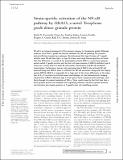Strain-specific activation of the NF-kappa B pathway by GRA15, a novel Toxoplasma gondii dense granule protein
Author(s)
Rosowski, Emily Elizabeth; Lu, Diana; Julien, Lindsay; Rodda, Lauren B.; Gaiser, Rogier A.; Saeij, Jeroen; Jensen, Kirk D.; ... Show more Show less
DownloadRosowski-2011-Strain-specific activation of the NF-kappa B pathway by GRA15, a novel Toxoplasma gondii dense granule protein.pdf (2.672Mb)
PUBLISHER_CC
Publisher with Creative Commons License
Creative Commons Attribution
Terms of use
Metadata
Show full item recordAbstract
NF-κB is an integral component of the immune response to Toxoplasma gondii. Although evidence exists that T. gondii can directly modulate the NF-κB pathway, the parasite-derived effectors involved are unknown. We determined that type II strains of T. gondii activate more NF-κB than type I or type III strains, and using forward genetics we found that this difference is a result of the polymorphic protein GRA15, a novel dense granule protein which T. gondii secretes into the host cell upon invasion. A GRA15-deficient type II strain has a severe defect in both NF-κB nuclear translocation and NF-κB–mediated transcription. Furthermore, human cells expressing type II GRA15 also activate NF-κB, demonstrating that GRA15 alone is sufficient for NF-κB activation. Along with the rhoptry protein ROP16, GRA15 is responsible for a large part of the strain differences in the induction of IL-12 secretion by infected mouse macrophages. In vivo bioluminescent imaging showed that a GRA15-deficient type II strain grows faster compared with wild-type, most likely through its reduced induction of IFN-γ. These results show for the first time that a dense granule protein can modulate host signaling pathways, and dense granule proteins can therefore join rhoptry proteins in T. gondii’s host cell–modifying arsenal.
Date issued
2011-01Department
Massachusetts Institute of Technology. Department of BiologyJournal
Journal of Experimental Medicine
Publisher
Rockefeller University Press
Citation
Rosowski, E. E. et al. “Strain-specific Activation of the NF- B Pathway by GRA15, a Novel Toxoplasma Gondii Dense Granule Protein.” Journal of Experimental Medicine 208.1 (2011) : 195-212.
Version: Final published version
ISSN
0022-1007
1540-9538